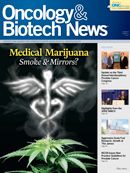Publication
Article
OBTN
New Gene Signature in Breast Tumors Predicts Resistance to Anthracyclines
Author(s):
In another discovery that may help tailor the treatment of women with breast cancer, researchers from the Dana-Farber Women's Cancers Program determined that overexpression of the LAPTM4B and YWHAZ genes on chromosome 8q22, combined with amplification of other genes, conveys resistance to anthracyclines and increases the likelihood of metastatic recurrence.
Click here to view as PDF.
LAPTM4B
YWHAZ
LAPTM4B
YWHAZ
In another discovery that may help tailor the treatment of women with breast cancer, researchers from the Dana-Farber Women’s Cancers Program determined that overexpression of the and genes on chromosome 8q22, combined with amplification of other genes, conveys resistance to anthracyclines and increases the likelihood of metastatic recurrence. is a lysosomal gene, and has antiapoptotic properties.
The team examined samples of breast tumor tissue from 85 patients obtained prior to treatment and looked for common gene signatures in women who had poorer outcomes to neoadjuvant and adjuvant therapies. After identifying the gene abnormalities on chromosome 8q22, the scientists tested untreated breast cancer cells in vitro. They found that anthracyclines such as doxorubicin, daunorubicin, and epirubicin failed to stop cell growth in samples with the gene signature.
The tumor cells did respond to other chemotherapy agents, such as paclitaxel and cisplatin, according to Andrea Richardson, MD, PhD, and Zhigang Charles Wang, MD, PhD, the investigators who led the study. “These results suggest that tumors resistant to anthracyclines may still be sensitive to other agents,” Richardson said.
LAPTM4B
YWHAZ
Next, the investigators looked at data from a Belgian study that administered neoadjuvant chemotherapy with anthracyclines prior to tumor excision. Based on expression levels of the and genes, the investigators were able to predict which women would fare poorly on anthracyclines.
Nature Medicine
The team is working to develop an assay for the gene signature, designed to be used prior to therapy. They anticipate it being available for clinical use in 1 to 2 years. “Most breast cancer patients are initially given the same drugs,” Richardson said, explaining that the test would prevent patients from unnecessary exposure to toxicities associated with anthracycline use and improve outcomes by ensuring that patients receive more effective drugs sooner. The article by Li et al was published in .
